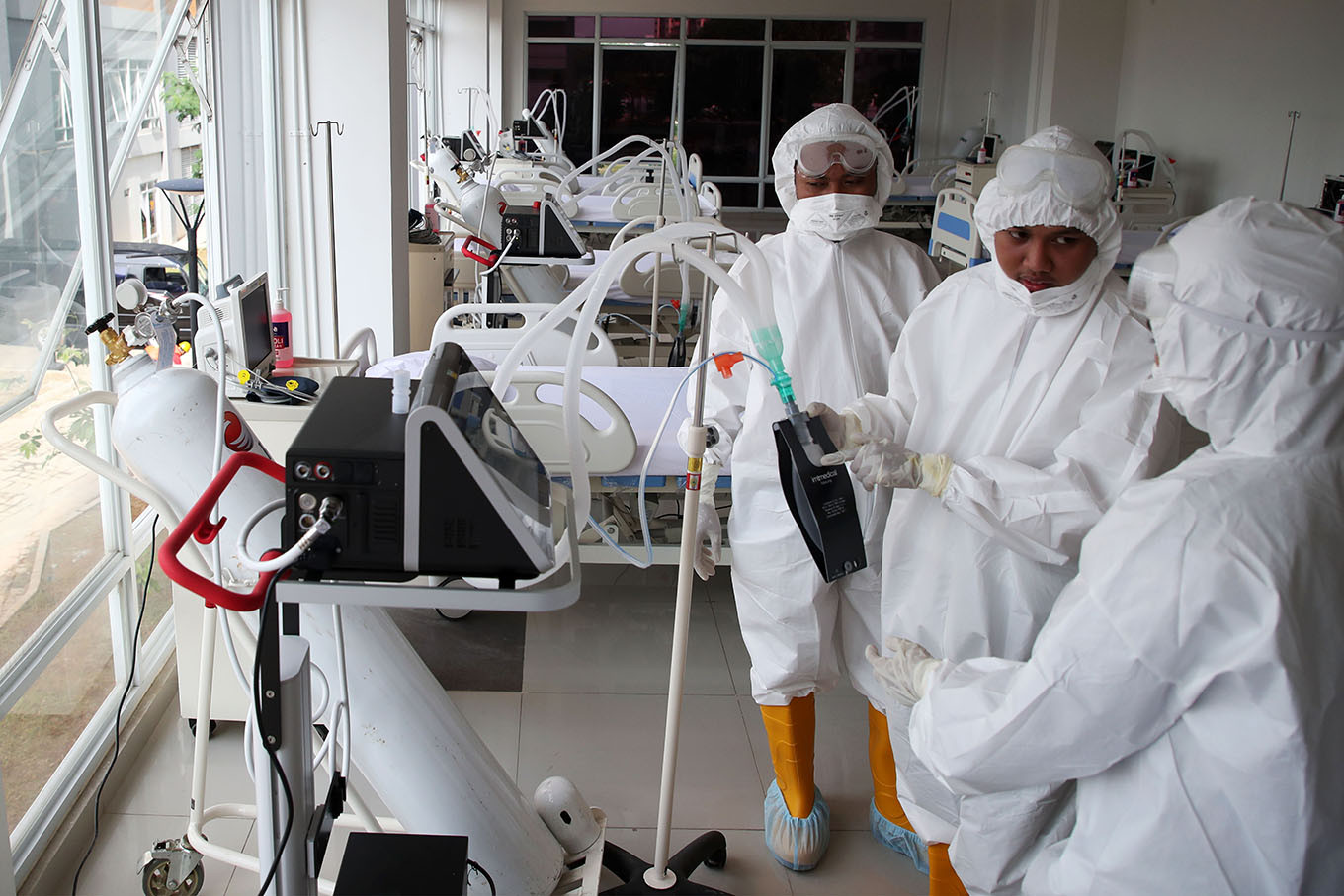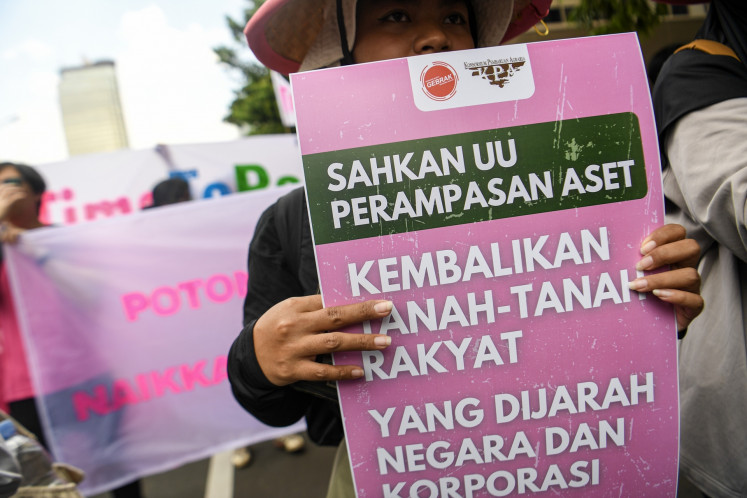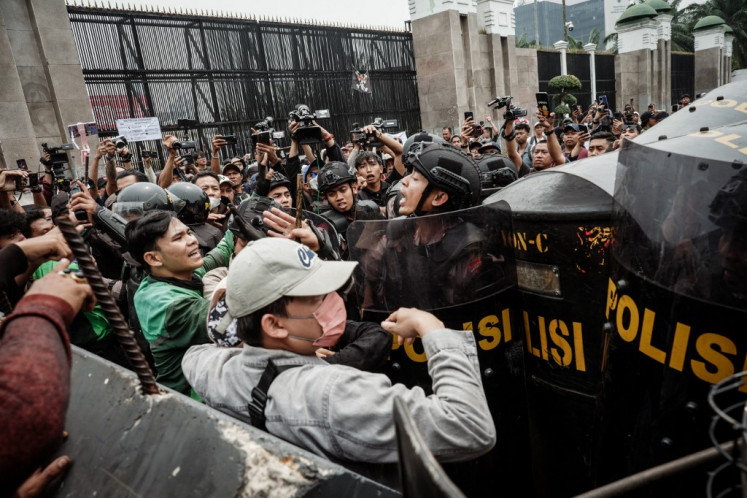Popular Reads
Top Results
Can't find what you're looking for?
View all search resultsPopular Reads
Top Results
Can't find what you're looking for?
View all search resultsHospitals more cautious, adjust services as Indonesia forges COVID-19 'new normal'
Change text size
Gift Premium Articles
to Anyone
L
ong queues and a throng of visitors are no longer common sights in hospitals across Indonesia as a result of the COVID-19 pandemic and it is likely to stay that way even as the country enters the so-called “new normal”, according to experts.
Hospitals and doctors’ associations are preparing protocols for the new normal period, which will include the COVID-19 screening of patients, limiting not only the number of patients and visitors but also procedures, by relying more on telemedicine, among other facilities.
"Hospitals will have to double their caution," Indonesian Hospital Association (PERSI) secretary general Lia Gardenia Partakusuma said, pointing to the possibility of a second wave of coronavirus infections.
The protocols, she said, would aim not only at preventing new in-hospital infection clusters, but also to rebuild the confidence of non-coronavirus patients in visiting hospitals.
People have been avoiding hospitals for fear of contracting COVID-19, while the growing number of infected medical workers, some succumbing to death, has also forced hospitals to reduce their capacity.
Hospitals have also suspended some non-emergency procedures, especially dentistry, elective surgeries and ear, nose and throat (ENT) services, as suggested by the Health Ministry since April.
These limitations are likely to remain in place and will only be relaxed gradually over time as the risk of infection declines, Indonesian Doctors Association (IDI) deputy chairman Adib Khumaidi said, expressing caution as the country had yet to reach its peak of infections.
"There must be a clustering of hospitals specified for COVID-19 and non-COVID-19. There are many people with non-COVID-19 problems that should be receiving our attention and treatment but many of them are afraid to visit hospitals and thus cannot undergo the [necessary] treatments," he said.
Read also: Indonesia records unprecedented daily spike in COVID-19 cases as ‘new normal’ commences
The central government and local administrations have nominated over 140 COVID-19 referral hospitals, although not exclusively for treatment of COVID-19.
Adib said that the majority of hospitals in the country were not designed to treat infectious diseases like COVID-19, hence they would need some redesigning in this transition phase, such as separate entrances for patients based on their initial COVID-19 screening results to avoid cross-infections.
A thorough mapping of hospitals' human resources, facilities -- such as negative-pressure isolation rooms and ventilators -- as well as the life cycles of medical devices and supplies of medicines and personal protective equipment (PPE) should be the utmost priority, he said.
"Ideally hospitals must have something like 'fever clinics' to separate patients with infectious diseases from other patients. [...] COVID-19 is not the only infectious disease [...] so it's better to keep them permanently, not only for the COVID-19 pandemic," epidemiologist Panji Hadisoemarto said.
The term fever clinic is used in several foreign countries for a hospital unit tasked with triaging patients with fever and respiratory symptoms during a pandemic and they are usually separated from the general practices and emergency departments.
However, smaller hospitals in Indonesia would struggle with these changes, including if they have to adopt telemedicine, while earmarking hospitals specifically for COVID-19 treatment would not be feasible in all regions, Lia of PERSI said. Hence, hospitals would have to spare beds for isolation units, as well as preparing separate access to prevent cross-infection, all the while screening patients with rapid antibody tests if deemed necessary.
Read also: Non-coronavirus patients grow wary as hospital crisis looms
Out-of-pocket spending on the screening test, which may cost hundreds of thousands of rupiah, has become a public concern recently after a breast cancer patient reportedly could not be admitted to a hospital in Surabaya, East Java, because she could not afford to pay for the test. She died a day later. She was a national health insurance (JKN) policyholder, which is managed by the Health Care and Social Security Agency (BPJS Kesehatan).
BPJS Kesehatan has reprimanded partner hospitals for charging for the tests and instructed them not to make them mandatory, but observers say the government, possibly through the JKN program, would need to subsidize the tests to guarantee a patient’s right to treatment and to ensure the safety of medical workers.
The pandemic has disrupted hospitals' cash flows, with hospital occupancy rates falling to between 20 and 50 percent across Indonesia, the Health Ministry's director for referral health services Tri Hesty Widyastoeti Marwotosoeko said in early May.
Hospitals are still waiting for the government to fully pay their claims for COVID-19 treatment fees, which are pending verification by BPJS Kesehatan before the government, through the Health Ministry, can disburse the money.
State-Owned Enterprises Minister Erick Thohir previously said treatment for a COVID-19 patient could amount to Rp 105 million (US$7,330), or Rp 215 million for a patient with comorbidity.
BPJS Kesehatan said that at least 291 hospitals had filed claims as of May 27, some of which had been verified and submitted to the ministry.
In a Health Ministry circular in April, the government -- which has categorized the disease as a non-natural disaster, hence ineligible for JKN coverage -- promised to pay for all COVID-19 treatments in all hospitals. That includes treatments for people positive with the disease and patients under surveillance (PDPs) regardless of age and condition; people under observation (ODPs) aged 60 years old and above; as well as ODPs aged below 60 years old with comorbidity.
Read also: COVID-19 exposes flaws in Indonesia’s health insurance program
Lia said hospitals expected the government to disburse the money by June, or some of them would be "overwhelmed". She recommended more relaxed and flexible claim requirements.
Timboel Siregar from watchdog BPJS Watch said that in entering the new normal, the government would have to consider redefining COVID-19 as a disease that could be fully covered by the JKN program to prevent patients' out-of-pocket spending.
However, Achmad Yurianto, the government's spokesperson for COVID-19, said there would be no changes in the payment scheme as the pandemic would remain under the category of non-natural national disaster.
Yurianto, however, referred further questions on the government's healthcare plan during the new normal to the Health Ministry's director general for health services, Bambang Wibowo, who did not immediately respond for comment.










